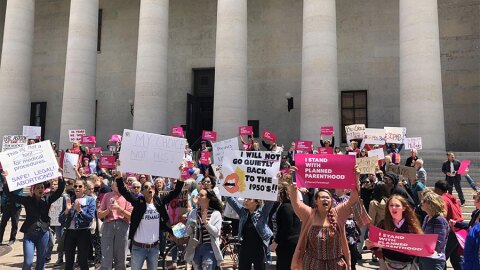A federal judge on Thursday denied a request to throw out a temporary restraining order that blocks Ohio from banning surgical abortions during the coronavirus pandemic. The Ohio Attorney General is appealing the ruling.
On Monday, U.S. Judge Michael Barrett ruled that Ohio officials cannot use a public health order banning "non-essential" procedures to stop surgical abortions in the state.
"Enforcement creates a substantial obstacle in the path of patients seeking pre-viability abortions, thus creating an undue burden on abortion access," the ruling read.
The 14-day temporary restraining order says abortion providers must determine on a case-by-case basis if a surgical procedure can be safely delayed.
Attorney General Dave Yost requested a stay of the restraining order and appealed the decision to the U.S. Sixth Circuit Court of Appeals, citing the Health Department's need to preserve personal protective equipment for coronavirus treatment.
On Thursday, Barrett shot down Yost's request. He wrote that his order follows the Health Department's own logic on essential procedures, which he says includes if "postponement results in irreversible conditions." Because of Ohio's own restrictions, delaying a surgical abortion could mean the patient is unable to secure one at all.
Barrett again ruled that abortions must be permitted to protect the health of the mother or to "preserve the mother's exercise of her Fourteenth Amendment right to a pre-viability abortion."
The original lawsuit was filed by Preterm Cleveland, Planned Parenthood and the ACLU of Ohio. The clinics say they're recommending clients for medication abortions when possible.
Similar legal battles have been playing out across the country. A judge blocked a similar order from taking effect in Alabama.
In Texas, after a federal judge originally sided with abortion providers, the 5th U.S. Circuit Court of Appeals reversed course and ruled that the governor's order suspending abortions during the pandemic can continue.






